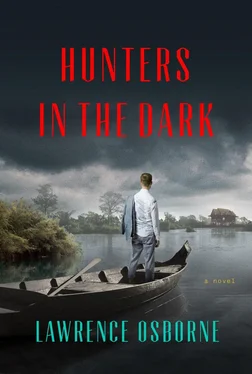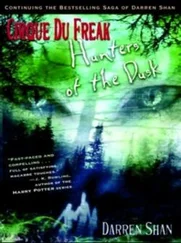—
He had been walking along the river all day. His face was burned and tanned at the same time and it made him look older and more rugged, more worn in. It was a look she liked in white men. When they burned off their pallor they seemed to come visually alive, and alive in other ways too. He made a quick joke about the formality of Van and she shrugged and said it was her father’s favorite restaurant.
The terrace seemed submerged in trees, in frangipani flowers; the walls of the building exactly the same sorbet yellow as her father’s house with the same white stucco. An Italian villa of some kind. Only the vast and violent clouds gave away the true location.
“Steak Rossini?” Robert said.
“There’s nothing wrong with it.”
“I ate it last time with your father.”
He sat and took her hand and turned it for a moment and kissed the back and the light sweat came off on his mouth.
“You look like — I don’t know what.”
“Don’t say princess. ”
It was the word he’d been about to use.
“Something like a princess.”
She called the waiter.
“Two Kir Royales. Actually, no, this time I’ll have mine de mure. I always go from blackcurrant to blackberry.”
Robert glanced at the empty glass in front of her.
“I’ll have the blackberry one as well then.”
“Yes, sir.”
“You can have it with red too,” she said. “It’s called a Communard.”
“I think not. Anything with a name like that here—”
She took his hand back and kissed it in turn.
“It was probably the only cocktail allowed in the seventies. I’ll ask my father about that.”
Fireworks began over the river, half obscured by the Banque d’Inchochine building. People stood still in the square and watched. A fairy atmosphere descended and the chemistry between them had slightly altered; a night’s sleep, a few hours to reflect. It was now a closer bond, to their surprise. It was she who talked. Some amuse-bouches came and they attacked them with little silver forks. Beyond the glass doors the rich old tourists ate by candlelight, sepulchral, and their motions with knives and forks were in comical slow motion. The chandeliers twinkled with a subdued melancholy which suggested that they had been there far longer than even these aging tourists had been alive. Robert, in any case, was glad to be above and beyond the sweaty real city for an hour and with someone else paying. He had walked for miles that day, past the Sofitel and along the jumbled river, and he couldn’t really tell her why. A confusion, a disorientation. An incoherent desire to walk out of the city altogether. He had sat on a bank of weeds some miles out of the center and felt each minute passing like a miniature century. A migraine throbbed through his head and he felt himself wishing that he was somewhere else. Vietnam, perhaps, or even China. Just somewhere farther on where not even one person knew him and where he could be himself again. Sooner or later he would have to do that anyway. When he looked at Sophal’s face he felt a sullen guilt and he wanted to just tell her everything in a few brutal sentences. But it would never happen. The deeper he sank into his own lie, the deeper he would drag her until they were both so deep in, it would no longer be worth trying to crawl out of it.
“My father likes you more and more,” she was saying. “He likes the idea of you more than anything, I think. I’ve always thought the idea of a person and the person himself are more or less the same.”
“I wish I could talk him out of that. I don’t really understand—”
“He says, by the way, I should take you to Phnom Chisor. It’s only an hour away and we could take the family driver. Like a picnic. Would you like to do that?”
“A day trip?”
“Yes, and you might even like it. Of course I don’t know what you like. It’s a ruined temple, like Angkor but lonelier.”
“I like ruins. Or I think I like them.”
“We’re famous for our ruins. People who come here are more interested in our ruins than they are in us.”
“They have to be interested in something.”
“But not you — you don’t seem interested in anything.”
“I’m a bit aimless, it’s true.”
“I know you’re a pathless wanderer. I can tell.”
“Is that your phrase?”
She said, “That’s my phrase, yes. I’m always right too.”
He threw up his hands and smiled. “Then I’m a pathless wanderer. Is there a cure?”
“Marriage.”
“Then I’ll have to be pathless for a while—”
“You’ll be thirty soon. Then it’s almost too late.”
“Is it? Not in my country, it isn’t.”
“You’re not in your country.”
He put down his knife and fork and said he wanted to buy her a bottle of wine. A Bordeaux, no?
“Big spender!” she cried.
The Duhart-Milon, then.
It was a mad expense, but he calculated he could just about manage it and survive. He ordered the wine and she told him it was entirely unnecessary but that she was glad he had. She needed a serious drink and a bottle of Duhart-Milon was it. When it came they went quiet and it was poured and they raced into it with a childish pleasure.
“I love getting drunk like this,” she said. “In the dark on a terrace. With a silly boy.”
“So now I’m silly too?”
“Yes.”
In fact, the wine had gone to his head immediately.
“Shouldn’t I be teaching you English?”
“Go ahead.”
“I forgot the lesson.”
“Then there is no lesson today. You’ll have to make it up to me.”
“You’ve been speaking English since you were three.”
“Two.”
“So your dad is wasting his money.”
“Isn’t that his problem?”
“Well, I suppose it is.”
Robert cut into his timbale and he thought ahead for some reason — to the following day, to the following decade.
He said, “It seems quite unreal here. Has your father been coming to this place for years? It seems like his kind of place.”
“All of us have been coming here for years. It’s our place.”
“Your father seems very kind. He didn’t need to give me that money. I didn’t want to take it—”
“I wouldn’t worry about that. He wanted to help you.”
“That’s just the thing — I don’t understand why.”
“There’s nothing to understand. It’s a feeling — he has a feeling for you. It’s enough for him.”
“I’m not even teaching you English. He knows perfectly well you speak it perfectly.”
“Perfectly.”
“So it’s just a ruse, isn’t it? Perhaps I shouldn’t mind. I should just shut up and take the money.”
“That’s pretty much what you should do, Mr. Beauchamp.”
“In a way I did.”
She fed him a forkful of green beans.
“You have a charmed life. There’s something charmed about you. People do things for you — don’t they?”
“I wish they did. I don’t think they do.”
“You land on your feet anyway. They think you’re helpless and have to be helped.”
“I am kind of helpless.” He looked at her archly.
She said, “It’s your greatest asset. You never know what’s going on. There’s a definite charm in that, but I’m not sure it lasts forever. For the moment you’re doing very well.”
“You make me sound rather awful.”
“ Awful ’s an old-fashioned word. You’re not that, you’re something else. The maids say something amazing about you. They say you have an aura of disaster about you.”
She covered her mouth with her hand as she laughed.
“Jesus,” he sighed.
“They’re country women. They can see these kinds of things.”
Читать дальше












